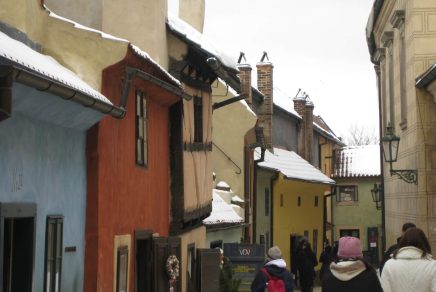Share the article
The culinary history of the Czech Republic is branded by war, invasions and hunger. Besides, like its capital, Prague, the country is at the crossroads of eastern and western routes. Several dishes are rooted in the local soil and we can find several very similar recipes in the neighbouring countries. It’s normal: most of these dishes are directly connected with the peoples who left their marks on the country: the Czechs themselves, of course, but also the Germans and the Austrians, the Russians, the Poles, the Slovaks and even ex-Yugoslavia.
Here are some of the most classical dishes of Czechia, such is the new, official name of the country, along with Czech Republic, and the restaurants where you can taste them in Prague!
Svíčková
Svíčková is one of the most emblematic dishes of the country. It consists in a beautiful piece of game or beef served with carrots, celery and onions, boiled together. The meat is plated and the juices are blended together to make a thick sauce. It’s sometimes garnished with a spoonful of cranberries. It’s a deliciously rich dish that will satisfy the biggest appetites.
The Americans have created their own version of svíčková, with marinated meat. This dish is mostly served in and around Chicago, where a big part of the Bohemian immigrants to the US settled.
To taste a svíčková in Prague, what would be better than the sumptuous setting of the Café Imperial?
Bramborak
Bramborak is the Czech version of a potato pancake and is very similar to what the Swiss call rösti or to what the Americans call hash browns. In Prague, you will be able to taste it cooked with garlic and marjoram and we can only advise you to eat it with a pint of cold Gambrinus !
It’s also possible to fold it back on a chicken fillet (what the Czechs then call a baron), a thin slice of beef (a pracny – “bear’s paw”) or meat with gravy (a cmunda).
There’s a nice place where you can eat this dish: The restaurant situated in the basement of the Apetit Gastrocomplex.
Prague Ham
Prague ham is slowly smoked with beechwood and has the speciality of being cooked boneless. It’s sold in all the neighbouring countries of the Czech Republic and it retains its name there, “Prague ham”. It’s often eaten with roasted potatoes.
Be cautious when you order one in Prague! Quite often, sellers sell helpings of this ham by the gram rather than by the slice. Don’t fall into this tourist trap. Know the weight, in grams, that you want to order ahead of time.
Malostransky Hostinec offers a wide array of local beers to drink with this ham.
Klobása
The klobása, the traditional Czech pork sausage, spiced with paprika and marjoram, is usually eaten grilled, with a piece of bread and mustard on the side. You can find this sausage nearly everywhere in Central Europe, mainly in Poland, where it’s one of the national dishes, there known as kielbasa, but also in Ukraine, in Hungary and in Austria, where it’s very popular.
The klobása can be found on every street corner in Prague, including on Wenceslas Square, in one of the many stalls that are set around the place.
Here’s a pro tip for you: go and watch a hockey game in one of the two arenas of the city. There, you’ll be able to buy a klobása and a beer for much less than the price of a hot dog at the Montreal Bell Centre…
Kulajda
Kulajda is a dill-flavoured soup made of mushrooms, sour cream and potatoes. Its creamy texture and its slightly sour taste make it an ideal appetizer – if the portion is small enough! Contrary to the former dishes, kuladja has no different version or imitation in the other countries of Central Europe.
Le restaurant V Zátiší offers a modern version of it, served with a quail egg.
Knedlíky
This is a famous side dish all across Central and Eastern Europe. People more or less lived on that stuff, thanks to its low cost and the availability of its ingredients, particularly during the Communist period. It’s true: People were very hungry at that time.
It’s a simple dumpling of white dough. The Czech version includes baking powder and rises slightly. It’s plain and simple, and it’s a belly stretcher. Still, no real Czech meal is complete without it!
All traditional restaurants without exception serve them. Here is a very good one: Tri Stoleti.
Fruit Turnovers (Svestkove Knedliky)
Whether stuffed with soft white cheese, strawberries, plums or blueberries, these delicacies can be found on all tables in Prague, especially during the summer, when the fruits are the freshest. It’s one of the favourite desserts of all Central Europe, invented at the time of the Austro-Hungarian empire at the beginning of the 19th Century. You can find versions of it in all the neighbouring countries, from Poland to Bulgaria, and from Croatia to Ukraine.
You can find excellent fruit turnovers in Café Savoy.







